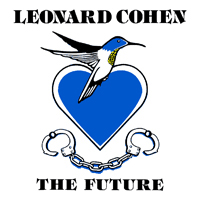The Future (Leonard Cohen album)
| The Future | ||||
|---|---|---|---|---|
 |
||||
| Studio album by Leonard Cohen | ||||
| Released | November 24, 1992 | |||
| Recorded | January – June 1992 | |||
| Genre | Contemporary folk, soft rock | |||
| Length | 59:37 | |||
| Label | Columbia | |||
| Producer | Leonard Cohen, Steve Lindsey, Bill Ginn, Leanne Ungar, Rebecca De Mornay, Yoav Goren | |||
| Leonard Cohen chronology | ||||
|
||||
The Future is the ninth studio album by Canadian singer-songwriter Leonard Cohen, released in 1992.
After touring successfully in support of his "comeback" album I'm Your Man (1988), Cohen took a year off to help his son Adam convalesce after a serious car accident in the West Indies left the young man in a coma for four months. Cohen also began a romantic relationship with the actress Rebecca De Mornay. Anthony Reynolds notes in his book Leonard Cohen: A Remarkable Life that work on Cohen's ninth studio album "was not forged in one concentrated effort. The number of studios used ran into double figures and was spread between Montreal and Los Angeles, although the original plan was to record it in Montreal only, with the same personnel that had worked on I'm Your Man. The cast brought to bear on the album was more akin to a movie production and included both a choir and an orchestra..." The songwriting process had not gotten easier for Cohen over the years; in an interview with Q, the singer admitted, “I’ve never found it easy to write. Period. I mean, I don’t want to whine about it or anything but...it’s a bitch! It’s terrible work. I’m very disciplined in that I can settle down into the work situation but coming up with the words is very hard. Hard on the heart, hard on the head and it just drives you mad. Before you know it, you’re crawling across the carpet in your underwear trying to find a rhyme for ‘orange’. It’s a terrible, cruel job. But I’m not complaining."
According to Ira Nadel's 1996 Cohen memoir Various Positions, the title track was originally called "If You Could See What's Coming Next", and underwent extensive rewrites, taking up almost sixty pages in Cohen's notebook, while "Closing Time" took two years with Cohen even starting over from scratch on the song as late as March 1992. Nadel also reveals that "Anthem" was borrowed from Kabbalistic sources, especially the sixteenth-century rabbi Isaac Luria. In the Paul Zollo book Songwriters on Songwriting, Cohen explains that it takes him so long to finish songs because "Nothing works. After a while, if you stick with the song long enough it will yield. But long enough is way beyond any reasonable estimation of what you think long enough may be...'Anthem' took a decade to write. And I've recorded it three times. More." In the same interview, Cohen spoke at length about "Democracy," admitting that he wrote 60 verses for it:
...
Wikipedia
